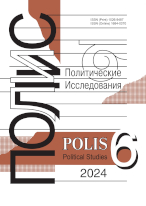France’s New Political Elite Against the Old Recruitment System
Gaman-Golutvina O.V.,
Moscow State Institute of International Relations (MGIMO University), Moscow, Russia; HSE University, Moscow, Russia; Russian Political Science Association, Moscow, Russia; RF Civic Chamber, Moscow, Russia, ogaman@mgimo.ru
elibrary_id: 250180 | ORCID: 0000-0002-2660-481X | RESEARCHER_ID: E-4046-2012
Solov’eva D.D.,
Ministry of Economic Development of the Russian Federation, Moscow, Russia, solovevadd@yandex.ru
DOI: 10.17976/jpps/2021.06.05
Gaman-Golutvina O.V., Solov’eva D.D. France’s New Political Elite Against the Old Recruitment System. – Polis. Political Studies. 2021. No. 6. https://doi.org/10.17976/jpps/2021.06.05
The article was prepared in the framework of a research grant funded by the Ministry of Science and Higher Education of the Russian Federation (grant ID: 075-15-2020-930).
The article analyzes the French experience of institutionalization of the political elite’s recruitment process. Although there are various channels for the recruitment of the French political elite, the education system is central in creating a framework, norms and procedures to train civil servants who make up the core of the political elite. The main issue is how appropriate it is for the state to have an active engagement in the process, characterised by the formation of a separate ecosystem of schools empowered to train the political elite, unequal financing, specific process of employment. On the one hand, such a system is increasingly close to meritocratic ideals, ensures the foreseeability of methods and expertise of the ruling class. On the other hand, it provokes criticism about the alleged closeness of the political elite, the divide between elite’s mindset and lifestyle and those of the majority of population. The “yellow vests” protest against the Parisian political elite fueled discontent, making the government commit to reform what is widely thought to be the main pillar of elitism in the French education – the National School of Administration. The article analyzes whether ENA’s reform really changes the recruitment procedure and makes the political elite more open and representative, leading to a comprehensive reform of elite education. It studies the key recruiting education institutions, calculates the concentration indexes and assesses the real role of the National school of Administration in the process of recruitment. While studying the strengths and weaknesses of the system and the French government’s efforts to mitigate them, the French experience characterized by a high level of institutionalization is compared with the British one, where the education system is as efficient a channel of recruitment, despite being less regulated. In conclusion, the authors suggest possible measures for an optimal reform of the elite education system in order to preserve its advantages.
References
Birnbaum P. 1994. Les Sommets de l’Etat: Essai sur l’elite du pouvoir en France. Paris: Seuil. 224 p.
Bourdieu P. 1996. The State Nobility: Elite Schools in the Field of Power. Cambridge: Polity Press. 475 p.
Burton M, Higley J. 2001. The Study of Political Elite Transformations. – International Review of Sociology / Revue Internationale de Sociologie. Vol. 11. No. 2. P. 181-199. https://doi.org/10.1080/713674040
Dudouet F.-X., Joly H. 2010. Les dirigeants francais du CAC 40 : entre elitisme scolaire et passage par l’Etat. – Sociologies Pratiques. Vol. 21. No. 2. P. 35-47. https://doi.org/10.3917/sopr.021.0035
Gaman-Golutvina O. 2014. Parliamentary Representation and MPs in Russia: Historical Retrospective and Comparative Perspective. – Parliamentary Elites in Central and Eastern Europe. Ed. by E. Semenova, M. Edinger, H. Best. London: Routledge. P. 241-260.
Griffiths D., Lambert P.S., Bihagen E. 2014. Measuring the Potential Power Elite in the UK and Sweden. – European Societies. Vol. 16. No. 5. P. 742-762. https://doi.org/10.1080/14616696.2014.941376
Hartmann M. 2000. Class-Specific Habitus and the Social Reproduction of the Business Elite in Germany and France. – The Sociological Review. Vol. 48. No. 2. P. 241-261. https://doi.org/10.1111/1467-954X.00214
Kessler M.C. 1986. Les grands corps de l’Etat – La Revue Administrative. Vol. 39. No. 231. P. 221-228. URL: https://www.jstor.org/stable/40779956 (accessed 22.09.2021).
Khan S.R. 2016. The Education of Elites in the United States. – L’Annee sociologique. Vol. 66. No. 1. P. 171-192. https://doi.org/10.3917/anso.161.0171
Suleiman E.N., Menderas H. 2013. Le recrutement des elites en Europe. Paris: La Decouverte. 264 p.
Trow M. 1973. Problems in the Transition from Elite to Mass Higher Education. in OECD. Berkeley, Ca: Carnegie Commission on Higher Education. 1974. 57 p.
Ashin G.K. 1998. Forms of Political Elites Recruitment’s. – Social Sciences and Contemporary World. No. 3. P. 85-96. (In Russ.)
Gaman-Golutvina O. 2016. Political Science as a Metadisciplinary Matrix. – International Trends. Vol. 14. Vol. 14. No. 1. P. 86-94. (In Russ.) https://doi.org/10.17994/IT.2016.14.1.44.7
Hartmann M. 2012. Modeli obrazovaniya ehlit v Evrope [Models of Elite Formation in Europe]. – Vlastnye struktury i gruppy dominirovaniya [Power Structures and Dominance Groups]. Ed. by A. Duka. St. Petersburg: Intersotsis. P. 10-39.
Lapina N.Yu. 2017. The Political Elite of Modern France. – Current Problems of Europe. No. 2. P. 105-126. (In Russ.)
Solovieva D.D. 2019. The Education System as a Channel for Recruiting the Political Elite in France. – Etnosocium. No. 9. P. 142-149. (In Russ.)
See also:
Gaman-Golutvina O.V., Solov’eva D.D.,
Who governs France: Macron’s 100 ministers. – Polis. Political Studies. 2023. No6
Kudryavtsev A.K.,
France Impressing the World. – Polis. Political Studies. 2019. No6
Tev D.B.,
Federal Administrative Elite of Russia: Career Paths and Channels of Recruitment. – Polis. Political Studies. 2016. No4
Selezneva A.V., Rogozar-Kolpakova I.I., Filistovich Ye.S., Trofimova V.V., Dobrynina Ye.P., Streletz I.E.,
Russian political elite: analysis from the perspective of the human capital concept. – Polis. Political Studies. 2010. No4
Tev D.B.,
Federal administrative elite of Russia: features of a career after leaving office. – Polis. Political Studies. 2023. No1





.jpg)






 print
print
.jpg)
.jpg)